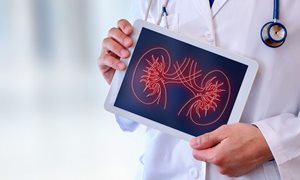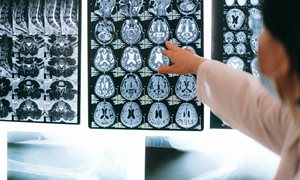 In Clinical Pharmacology & Therapeutics Floor Lubberman and colleagues showed that the intake of 600mg pazopanib with food resulted in a bioequivalent exposure and was preferred over a standard pazopanib dose without food. No differences were seen in GI-toxicities under both intake regimens. Patients seem to be more positive about their feelings about side effects and satisfaction with their therapy when pazopanib was taken with food. 41(68%) of the patients preferred the intake with continental breakfast.
In Clinical Pharmacology & Therapeutics Floor Lubberman and colleagues showed that the intake of 600mg pazopanib with food resulted in a bioequivalent exposure and was preferred over a standard pazopanib dose without food. No differences were seen in GI-toxicities under both intake regimens. Patients seem to be more positive about their feelings about side effects and satisfaction with their therapy when pazopanib was taken with food. 41(68%) of the patients preferred the intake with continental breakfast.
Publication
The effect of using pazopanib with food vs fasted on pharmacokinetics, patient safety and preference (DIET study).
Lubberman FJE, Gelderblom H, Hamberg P, Vervenne WL, Mulder SF, Jansman FGA, Colbers A, van der Graaf WTA, Burger DM, Luelmo S, Moes DJAR, van Herpen CML, van Erp NP.
Floor Lubberman is member of theme Urological cancers.
Related news items

Body composition is more important than BMI for renal cancer survival rates
11 January 2022 Body composition is important for survival rates in renal cell cancer. Research from the Radboudumc shows that low muscle quality and low organ fat are associated with poor survival. This involves different stages of renal cancer, ranging from stage I-III to stage IV. go to page
Turbo Grants for four medical-technical research projects
19 October 2021 Four TURBO grants were recently awarded to new technical-medical research proposals. The grants are part of the TURBO program, a collaboration between the University of Twente (TechMed Centre) and the Radboudumc. go to page
Research into treatment for bladder pain syndrome will now be reimbursed
4 August 2021 Bladder pain syndrome, also called interstitial cystitis, is a chronic benign condition of the urinary bladder go to page
Millions of euros for study of laser treatment for glioblastoma
2 April 2021 A research group from Radboudumc and UMC Utrecht is to investigate laser treatment of a rare brain tumor, glioblastoma. 3.9 million euros has been made available for the research by Zorginstituut Nederland and ZonMw, under the auspices of the Subsidy Scheme for Promising Care. go to page
Growing consensus in Europe on prostate MRI
4 June 2020 A group of radiologists and urologists has made a new set of recommendations to improve the quality of prostate MRIs. go to page
Jurgen Fütterer appointed Professor of Image-Guided Oncological Interventions
26 February 2020RIHS researcher Fütterer is an interventional radiologist and an expert in the field of cancer imaging techniques, image-guided interventions and robotics. He is also Professor at the Robotics and Mechatronics Group at the University of Twente.
go to page